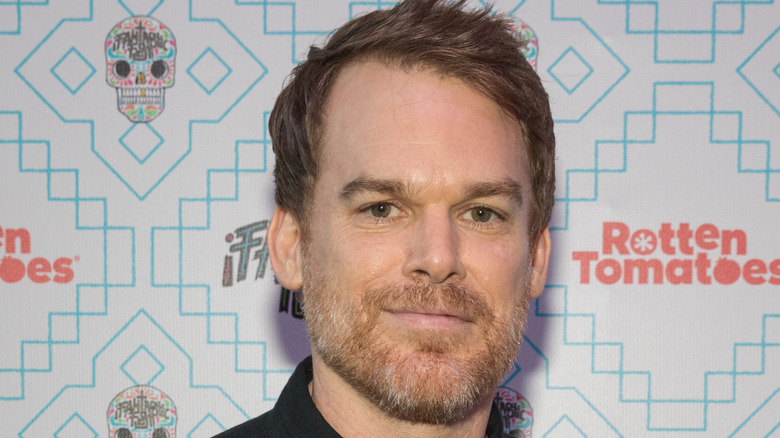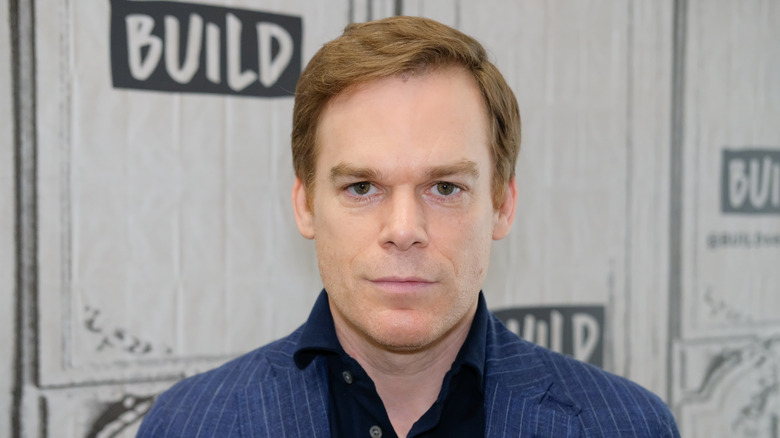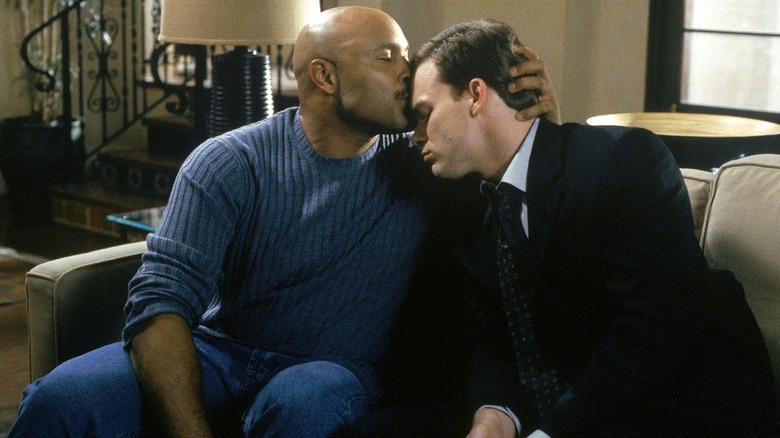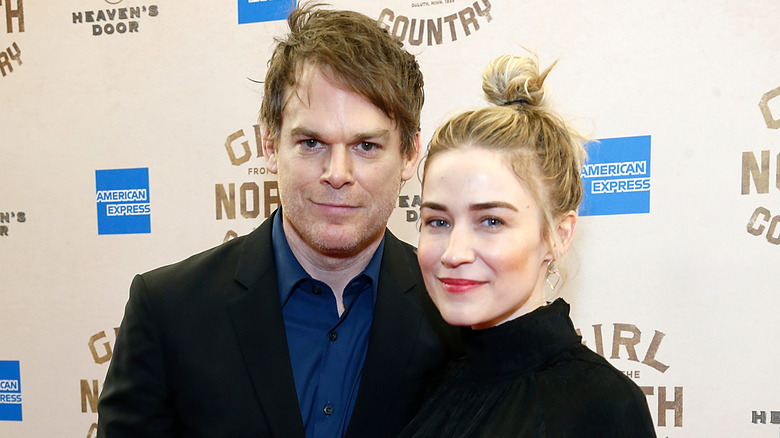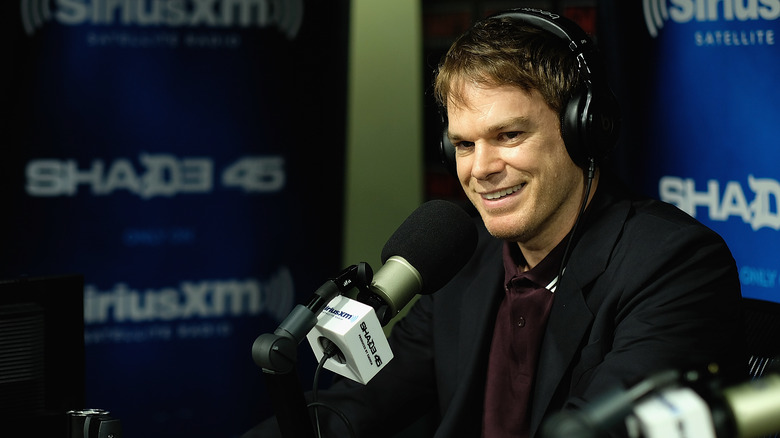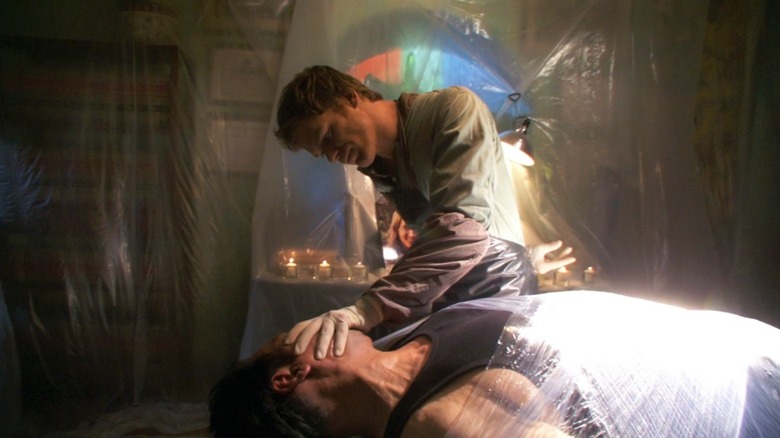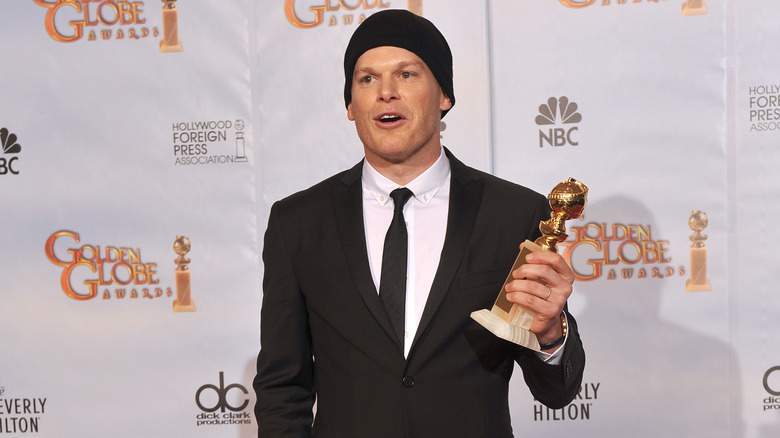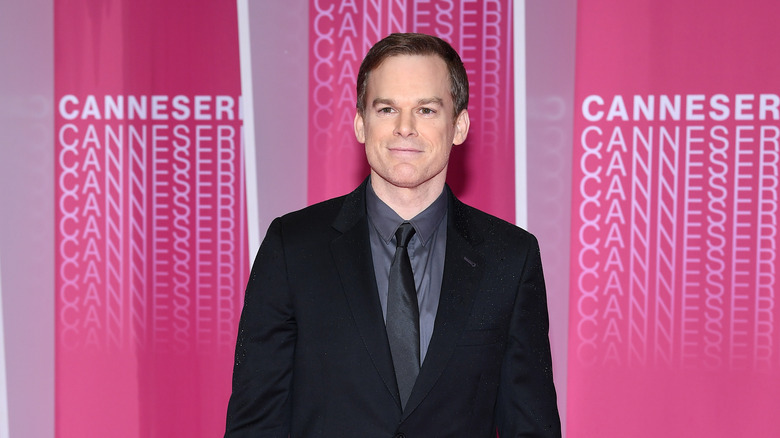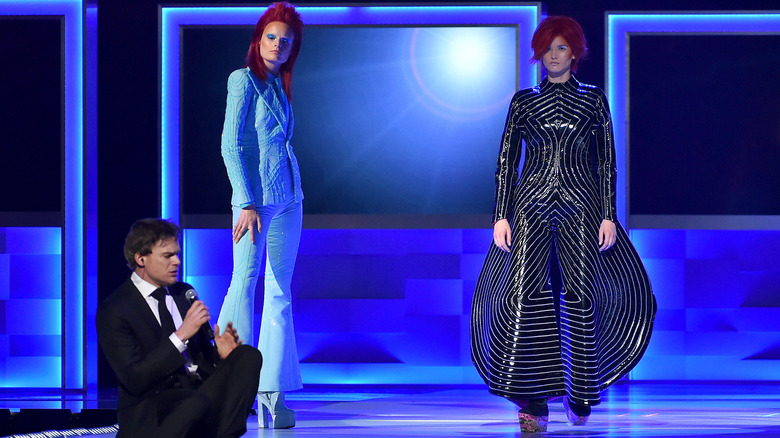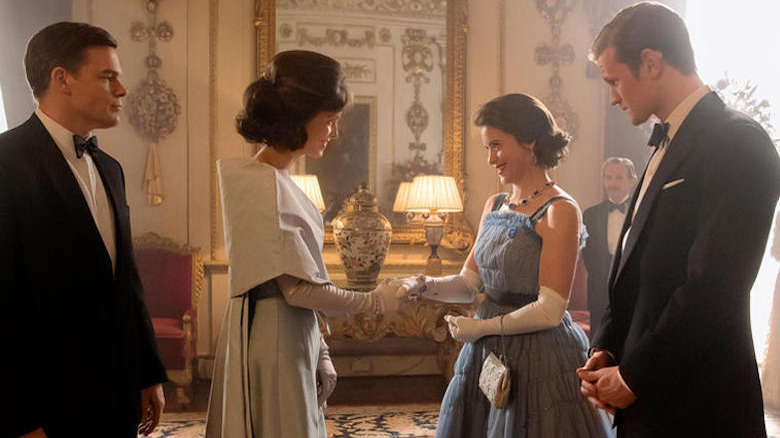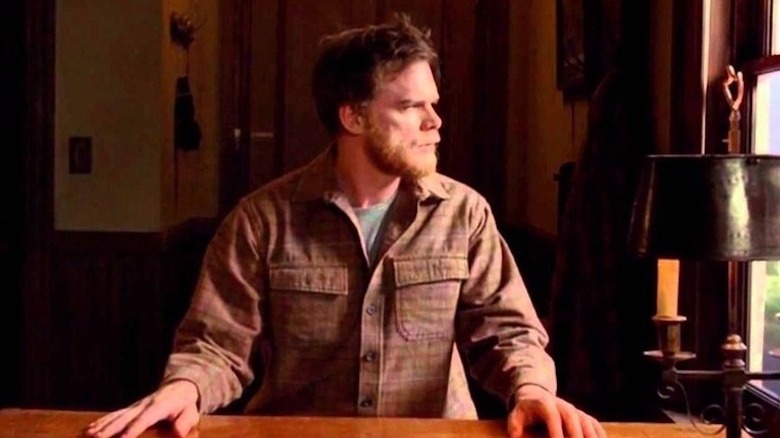The Untold Truth Of Michael C. Hall
Best known for his portrayal of the serial killer of other killers, Dexter Morgan, in the Showtime series, "Dexter," Michael C. Hall has been a working actor for decades now.
After getting his start on the stage, Hall landed a main role on HBO's "Six Feet Under," a critically acclaimed drama about a family that runs a funeral home. After playing David Fisher on "Six Feet Under" from 2001, 2005, Hall immediately transitioned to "Dexter," which aired in 2006 and ran for eight seasons. During his run on "Dexter," Hall received immense praise for his performance of the titular character, even earning himself a Golden Globe win in 2010 for in the Best Actor – Television Series Drama category.
Since "Dexter" ended, Hall has focused on a range of smaller, shorter-lived projects, from stage productions to limited series like 2018's "Safe," in which he starred. Hall will next be seen in the "Dexter" revival, reprising his role as the popular serial killer.
With the "Dexter" revival currently in the works, Hall is more in the spotlight now than he has been in several years — probably since "Dexter" initially ended — as his latest projects have been lower-key than the Showtime drama. With Hall in the spotlight, there's no better time to dive into the actor's untold truth.
Hall comes from a conservative background
On "Six Feet Under," Hall played a gay man back when it was still quite rare to have a LGBTQ character in such a prominent role. It was a progressive move, both on HBO's part and on Hall's, seeing as that could've pigeonholed him as an actor. It also ran counter to the conservative North Carolina environment in which Hall grew up.
In an interview with Daily Beast, Hall discussed his upbringing, saying, "More generally, the larger family and environment were somewhat repressive and puritanical." Additionally, while speaking with NPR, host Ophira Eisenberg brought up how Hall has mentioned in the past that his family is so conservative that they've actually sympathized with his character on "Dexter" more so than his character on "Six Feet Under" — despite the former being a serial killer.
Hall elaborated: "I mean, I grew up in North Carolina, and both my parents were from a very small town and somewhat conservative ... I didn't really appreciate just how much David Fisher freaked my family out until I came home after they'd seen 'Dexter,' and they're like, 'You're so great as Dexter. You know, just, I love the way you killed those people. But... I hate the way you kissed that man,' you know?"
In that same interview, Hall noted that, while he has never been attracted to another man, he feels he is "not all the way heterosexual" in the sense that he craves emotional intimacy with men. Hall has suggested this desire for connection with men might relate to missing his father, who died when he was 11. Growing up in a community with strict gender roles meant that Hall stood out: "... emotional intimacy or connection ... in the milieu I grew up in was considered fey. I had an appetite to have emotional connections with men beyond beer, sports, and fist pumping that were considered 'gay.'"
It can't have been easy growing up in a place where identities weren't celebrated and, as Hall put it, "ebullience and enthusiasm were discouraged."
He found it "gratifying" to play a gay character
During an interview with Mental Floss looking back on "Six Feet Under" 15 years after it ended, Hall discussed playing a gay character at a time when doing so was still fairly uncharted territory. There were exceptions — "Roseanne" had a one-off episode with a lesbian wedding and "Friends" featured a lesbian relationship in the 1990s, while early 2000s staples "Dawson's Creek" and "Buffy the Vampire Slayer" had storylines involving gay and lesbian side characters — but "Six Feet Under" was the first TV show with a gay protagonist. It also remains one of the most intimate, realistic, and in-depth depictions of a long-term, committed gay relationship to ever air. (It is also a rare interracial one; Hall's character, David Fisher, is white, and his partner Keith (Mathew St. Patrick) is Black.)
Hall said, "I felt enormously proud and humbled being charged with playing a character who was unique in the television landscape ... it's a gratifying thing, as gratifying as anything I've done."
He also looked back on the feedback he's received from viewers over the years, continuing, "People saying that spending time with the character, seeing that relationship, helped them change their idea of a gay couple, or to have people say the existence of David and his story gave them strength at a formative time, is amazing."
During his interview with Mental Floss, Hall reflected on the changing landscape in terms of which actors should get to play gay characters — namely that LGBTQ roles should largely go to LGBTQ actors. Hall said, "For me, I was playing this aspirationally iconic gay role as a straight man. I felt all the more charged to do it justice. I certainly understand anyone who takes issue with the phenomenon ... I was aware that I was a heterosexual man playing a gay role that was unique in the TV landscape. I was also aware that given the way things are and maybe still are to a degree that not many gay actors were pursuing the role. It would expose them in a way. That irony wasn't lost on me."
Hall has been married three times, twice to co-stars
It's not uncommon for actors to date or even sometimes marry their co-stars. Actors spend so much time on set together that it's no surprise off-screen relationships result. Hall can attest to this, as he's married a co-star twice in his life. The first, as reported by The Guardian, was to Amy Spanger, with whom he co-starred in the 2002 Broadway revival of "Chicago" (Hall played Billy Flynn and Spanger played Roxie Hart). Besides the fact that they were married for a few years before divorcing in 2006, very little is known about this relationship, as Hall hasn't really spoken about it publicly.
His second marriage was much more interesting to the public, as he married his "Dexter" co-star, Jennifer Carpenter, who played Dexter's sister, Deb, on the show. The two eloped in December of 2008, a few years into the "Dexter" run. The pair then divorced in 2011, meaning they still had to work together for two more years before the series came to an end — talk about awkward! Per The Guardian, when the two were asked at a live event what it was like to work together after their marriage ended, Hall responded, "Our marriage didn't look like anyone else's, and our divorce didn't either. Just because our marriage ended doesn't mean the love did."
Currently, Hall is married to Morgan Macgregor, a writer, editor, and book reviewer for the prestigious Los Angeles Review of Books. Hall and Macgregor married in 2016. To Daily Beast, Hall said of his wife, "It's been great. She's just an incredible friend and is a remarkable combination of intelligence and kindness, and she's able to tell me the truth in a way that I can actually stomach."
Hall has played the same role twice
Before Hall made his way to primetime television, he worked primarily in theater, beginning in college. One of those college roles was The Emcee in the 1966 musical "Cabaret" — a role that he went on to play again not too long after his undergraduate run.
The second time was in a 1998 Broadway revival directed by Sam Mendes, who's known for making critically acclaimed films such as "American Beauty," "1917," and "Revolutionary Road," as well as James Bond films "Skyfall" and "Spectre." Hall was cast after Alan Cumming, who was initially slated for the role, had to pull out of the production.
In an on-air interview with NPR, Hall discussed landing the part for the second time and sneakily keeping it to himself that he had played The Emcee in the past. Hall explained, "I did a workshop of a musical that Sam Mendes directed, and it coincided with him needing to find someone to replace as The Emcee ... He saw something that made him think that maybe I'd be right for it. I was called at noon ... But I didn't tell them when I came in at 6 after having found out just six hours ago that I was going to audition that I'd played the part in college. They were, like, wow, he really learned those songs ... Quick. And I just was, like, yeah, they're catchy..."
In that same interview, Hall also spoke about all the odd jobs he had to do to support himself before his career took off, including selling suits, moving furniture, and working as a technician in a post-op recovery room. Never give up on your dreams, kids.
He sympathizes with Dexter
Anyone who has seen "Dexter" knows how confusing it can be to sympathize — and even actively root for — a character who is literally a serial killer. But Hall somehow manages to make Dexter likable, though you know he is rooted in darkness. Plus, the fact that Dexter's "code" only allows him to kill other killers makes it much easier to support as an audience member.
As for Hall, while he was playing the character, he chose not to label Dexter as either moral or immoral, instead thinking of him in an ambiguous middle ground. In an interview, Hall told Entertainment Weekly, "I'm reluctant to come down on one side or another, with this or any character. I like that he operates in a morally gray area. He's moving toward the light in some ways, but as a result the darker stuff is all the darker because of it. I like that the spectrum between the light and dark of the character has broadened."
Further, EW asked if Hall lost his sympathy for Dexter at any point. Hall responded, "No. I wish that he could be liberated from his compulsion. I have sympathy for him because of that."
Hall had cancer during the Dexter run
Toward the end of filming the fourth season of "Dexter," Hall received some sobering news: he'd been diagnosed with Hodgkin's lymphoma, which is a cancer of the immune system. As he told The Guardian, he decided to keep the news to himself while still on set, then began chemotherapy treatment as soon as the season wrapped. He also wanted to keep it a secret from the public and only changed his mind because of his Golden Globe nomination (which he ended up winning) in 2010.
He explained to The Guardian, "I thought, 'Well, I can treat this successfully and if my hair falls out [which it did] I'll wear a wig during the fifth season — and I won't even have to share with anyone that this is happening.' But I thought it would be conspicuous if I showed up (at the awards) without eyebrows, and so I made an announcement." Hall admits that he's glad he made a public announcement, as it can be "of value" to see someone successfully go through the treatment process.
Hall also talked to The New York Times ahead of the fifth season premiere of "Dexter," when his cancer had been confirmed to be in remission. The writer, Mike Hale, remarked that Hall both looked healthy and had an exuberant air about him. Hale wrote, "His hair had grown back, and the only possible sign of concern for health was his breakfast order: a lonely cup of chamomile tea. If anything, he said, he felt an extra energy after the effects of the chemotherapy wore off."
He's chill about death — both personally and professionally
Hall's cancer diagnosis at age 38 struck a familiar chord for the actor — his father had died at age 39 of cancer. He told the New York Times, "I think I've been preoccupied since I was 11, and my father died, with the idea of the age 39: Would I live that long? What would that be like? To discover that I had the Hodgkin's was alarming, but at the same time I felt kind of bemused, like: 'Wow. Huh. How interesting.'" Even before his dad's death as a child, his family life was already marked by tragedy, as his older sister had died from a heart disease before Hall was born. Talking to Daily Beast about his early life, he revealed that more family deaths followed his sister and his father: He also lost his aunt not long after his dad's passing and, in high school, lost three other family members.
Hall emphasized that this did not lead to a fascination with death, but rather a hyperawareness "of the fact of it, its inevitability, the fact it is one fate no one escapes." He also remained calm in the face of death, during his cancer diagnosis. He told Daily Beast, "It was scary, but I wasn't really frightened. I was more just interested in finding out the answers to questions surrounding what I needed to do, and eager to do them in terms of treatment."
With all this in mind, it seems natural for his career to lead him into roles so defined by death — first as a mortician on "Six Feet Under," then as a character compelled to take lives on "Dexter."
Hall looked up to David Bowie
Beginning in 2015, Hall starred in the Broadway production "Lazarus," for which late musician David Bowie wrote the music and lyrics. The play was based on the book by Edna Walsh, which, in turn, was inspired by the book "The Man Who Fell to Earth" by Walter Tevis (the source material for the 1976 film adaptation in which Bowie starred). With that Russian nesting doll of source material, "Lazarus" follows Thomas Newton, whom Hall portrayed, "a 'man' unable to die."
Bowie died in early 2016, not long after the show premiered in late 2015. Before Bowie's death, however, Hall got the chance to meet the famed musician after being cast — an encounter he says deeply changed him. Hall told Daily Beast, "He was all the obvious things that you would imagine when you think of encountering someone who's lived in the physical body and realities of what David Bowie is and represents. The molecules in the room change when he walks in. Countering that was such genuine kindness, humility, and presence. He was very real ... He didn't disappoint."
Hall also spoke to The Guardian about how supportive Bowie was of his performance and of the "Lazarus" production in general. Hall said that on opening night of "Lazarus" Bowie sent him an "very, very amazing" gift and note. Hall continued, "Out of respect for his intense privacy I'll just say that it was an artifact from his past that he had passed on to me. And it will be a talisman to me for the rest of my life."
He made a point to pursue shorter-term projects
It's hard to imagine anyone else playing the world's favorite serial killer, but it was almost a possibility. Coming off of five seasons of "Six Feet Under," Hall was hesitant to sign on for another long-term commitment, but the strength of "Dexter" convinced him. He told Daily Beast, "'When Six Feet Under' ended, I thought I should quit, because how do you top that? Then 'Dexter' came along. I was very fortunate."
He added that he would have to "think long and hard" about doing another longterm series. He continued, "The shows were exhausting at times. Inevitably, if you do something for that long, no matter how developed or evolved it feels, it feels like you're tilling soil that is no longer as fertile as it once was."
Naturally, once "Dexter" ended, Hall took a step back from TV and put a lot of focus into theater, such as "Lazarus" and playing the lead role in "Hedwig and the Angry Inch." The television roles that he has taken have either been guest appearances — such as his one-episode stint playing President John F. Kennedy on "The Crown" — or limited series, such as Netflix's 2018 series, "Safe." About this decision, he told The Hollywood Reporter, "I definitely had a desire to mix it up. I wasn't ready to take an immediate third open-ended commitment to a television character. I certainly don't rule that possibility out, but at the moment I'm enjoying bouncing around a bit more."
Hall didn't like the end of Dexter
"Dexter" remained largely critically acclaimed through most of its run — that is, until the last season (and the finale episode in particular). For those unfamiliar with the series (spoiler alert), it ended with Dexter's character faking his own death and isolating himself from his former life by starting a new, low-profile existence at an Oregon lumber company. The biggest complaints from fans were that the ending was too safe — he should have been caught or faced some sort of consequence — and that it threw away eight seasons' worth of growth, during which Dexter became a good father and even fell in love. The fan outrage probably played a major role in the series getting picked up for a revival.
With the revival now in the works, Hall has been asked recently about where we last left Dexter — and he has admitted to understanding fans' frustrations with the ending. He told Times Radio (via NME), "I think the show ended in a way that was pretty mystifying at best if not infuriating for people, but that at least set the stage for us to return and answer more definitively what the hell happened to this guy." He added that he agrees with Dexter's ultimate choice to isolate himself, but concedes that the execution could have been better.
Hall spoke further about why the ending didn't work: "Because he literally didn't say anything at the end. He had been talking to us the whole time and he just stared at the camera and it was over. He put his sister in the ocean. What the hell was that?"
Luckily, we'll get to find out when Hall returns to portray Dexter again.
